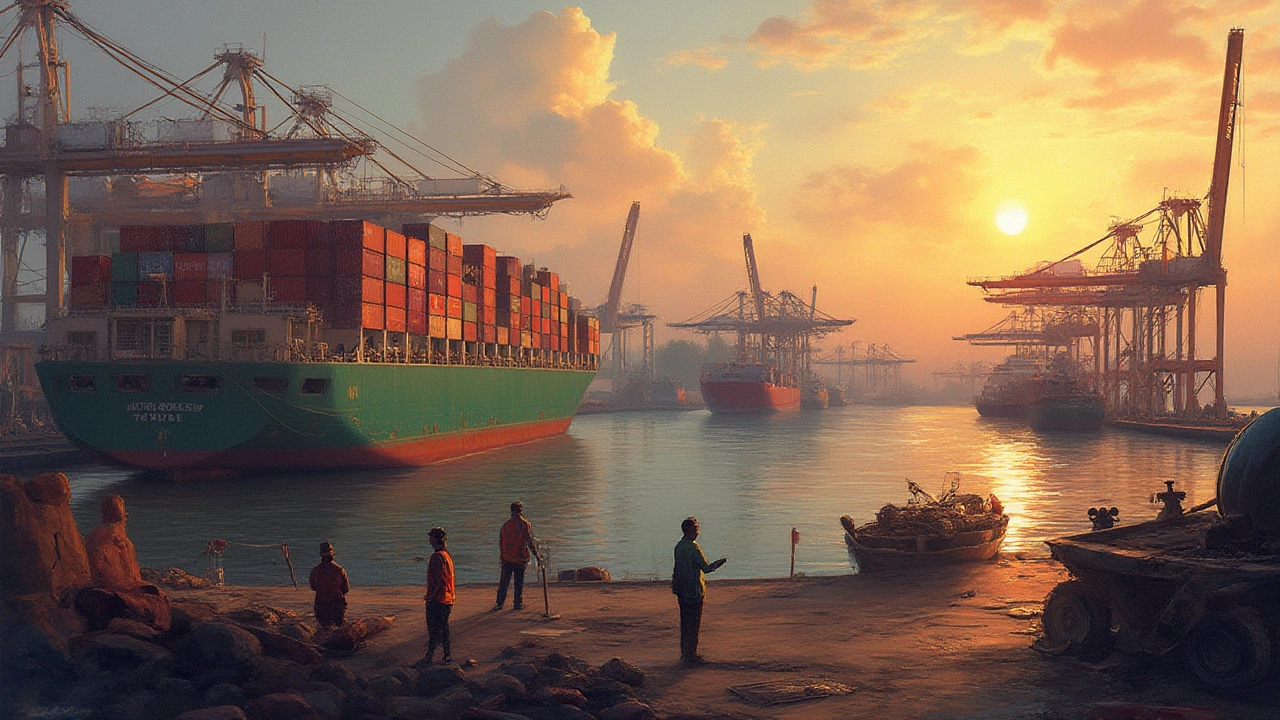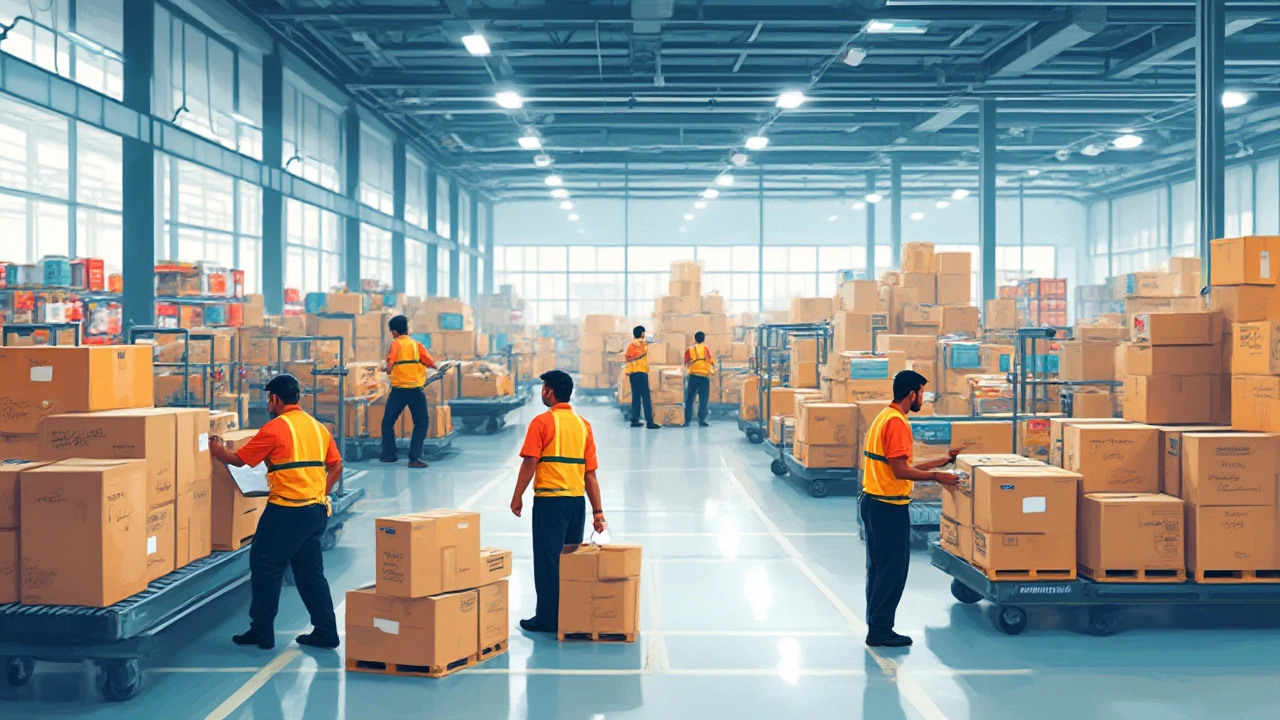Understanding the 3 Major Types of Foreign Trade: Export, Import, and Entrepot Explained

Picture this: a smartphone designed in America, built in China, and bought on a UK website, landing at your door in Birmingham. Ever wonder how it makes that journey? Spoiler alert: it's all thanks to the complex and fascinating world of foreign trade. With the planet more connected than ever, the things we use daily—from coffee beans to microchips—come from all corners of the globe. Whether you’re sipping Ethiopian coffee in Dudley or using a Japanese TV in your Birmingham living room, foreign trade shapes your life more than you might think. Yet, behind every product shipped across borders, there’s a system built on three main types of foreign trade. Let’s break them down and dig into the nuts and bolts that keep the world’s economy ticking.
What Exactly is Foreign Trade?
Foreign trade is basically the buying and selling of goods and services across national boundaries. It’s the engine that powers everything from your favourite chocolates crossing the Channel to massive deals between countries involving oil, machinery, and cars. It happens because no country has everything it needs or wants—some have oil, others have tech expertise, and some just grow the juiciest strawberries. Every country tries to make the best use of what they have and get what they don’t. And that’s when foreign trade steps in.
So, why does this matter? For starters, it brings us choice. Walk into any supermarket in Birmingham and you’ll see foods from dozens of countries. There’s also price—trade means more competition, which usually means lower prices, whether it’s for trainers or television sets. And then there are jobs; the UK’s export sector alone supported over 6.5 million jobs in 2023, according to the Office for National Statistics. Trade keeps industries afloat, gives us access to sunrise technologies, and lets small businesses go global from day one.
Still, foreign trade isn’t just about swapping stuff. It shapes politics, supports peace (or sometimes sparks rivalry), and decides what’s on your dinner table. The rules keep changing too. In recent years, trade debates have dominated politics, from Brexit making waves on UK-EU goods to global worries about trade wars. But most of these big changes come down to three basic types of trade—export, import, and even a weird-sounding one: entrepot. So, what do those actually mean?
Export Trade: Sending Goods Out
Export trade is perhaps the most talked about of the lot because it’s all about a country selling what it does best to others. If the UK ships Scotch whisky to France or German cars make their way to the United States, that's export trade in action. Exports are often celebrated as a show of national strength, raising money (we call it “foreign exchange”) and helping local manufacturers grow. No wonder governments fight to boost exports with grants, business advice, or bold trade deals.
The process itself is more complex than just loading goods onto a boat or a plane. It goes from negotiating deals, meeting international standards, arranging transport, and dealing with heaps of paperwork. Take British pharmaceuticals, for example. The UK is Europe’s biggest exporter of medicines, with shipments reaching over £24 billion in 2023. Those medicines have to meet strict safety rules in every country they’re sold in. Then there’s the issue of currency—selling to the US means getting paid in dollars, not pounds, so businesses must keep an eye on exchange rates.
Export trade isn’t just for big companies either. A Birmingham bakery making unique gluten-free treats can ship overseas thanks to platforms like Etsy or Amazon. That’s changed the game for small and medium-sized businesses. In 2023, nearly 20% of UK small businesses reported exporting goods, compared to just 9% a decade ago. Exporting lets firms reach millions more customers, spread out risk (so if demand drops at home, they don’t go bust), and learn from global trends.
But it’s not all smooth sailing. Governments often help with export insurance or credit, protecting exporters if a foreign buyer goes bust. The UK’s Export Credit Agency has backed more than £15 billion in deals since 2018. Here’s a quick look at the top 5 UK export products in 2023:
| Product | Value (£ Billion) |
|---|---|
| Pharmaceuticals | 24 |
| Machinery | 22 |
| Vehicles | 21 |
| Mineral Fuels | 19 |
| Beverages (including whisky) | 15 |
Something else you should know: export trade helps with innovation. Companies that export are 30% more likely to introduce new products, according to the Department for Business and Trade. That keeps the UK competitive, and it means you get better products as well.

Import Trade: Bringing Goods In
If export trade is about sending goods out, import trade is all about bringing stuff in. The UK buys a lot from overseas—think clothing from Bangladesh, electronics from China, wine from Australia, or avocados from Mexico. Imports fill gaps in what we can’t (or don’t want to) produce, offer cheaper choices, and sometimes even push local companies to up their game.
The top imports to the UK in 2023 looked like this:
| Product | Value (£ Billion) |
|---|---|
| Machinery & Computers | 31 |
| Vehicles | 25 |
| Pharmaceuticals | 21 |
| Clothing | 12 |
| Oil & Fuels | 11 |
You can’t talk about British imports without mentioning food. Did you know over 40% of all the food consumed in the UK is imported, according to the Food & Drink Federation? That’s why fruit bowls here are stacked with Spanish oranges, South African grapes, and bananas from the Caribbean. Even in jobs, import trade counts—a 2022 report showed more than 4 million jobs in the UK depend either directly or indirectly on imports, from truck drivers to IT specialists managing global supply chains.
There are challenges, of course. Importing means dealing with international regulations and taxes (tariffs), plus the risk of delays. Brexit, for example, brought in more paperwork and new customs rules, hitting everything from fresh food supply to auto parts. For businesses, surprises like a ship stuck in the Suez Canal or a new government rule abroad can mess up deliveries and prices overnight.
On a personal level, import trade lets you try things that just don’t grow in your garden—whether it’s coffee from Ethiopia or laptops from Taiwan. And for businesses here, it can slash costs. Look at Primark: they keep prices low by importing huge volumes from lower-cost countries. The flip side? There’s debate about job losses if companies import too much instead of buying British. But the reality is, most modern economies couldn’t function without imports. They’re not just about stuff either—importing skills and technology is a massive advantage for the UK. Universities, for instance, regularly import lab equipment and research kits from Europe, Japan, or the US.
What’s more, governments sometimes use import duties not just to raise money, but to protect local industries. For example, after new tariffs were slapped on Chinese steel in 2023, it gave a brief boost to UK steelmaking. But this can turn into a tit-for-tat trade war, driving up prices for everyone. Smart importing is all about balance: getting access to what you need, when you need it, without harming local jobs or the wider economy.
Entrepot Trade: The Middleman’s Game
Entrepot trade sounds fancy, but it’s basically re-exporting. Imagine goods arriving at a port in the UK, getting repackaged or refined, and then sent out again without being used here. It’s like being the middleman, moving products from one place to another (with or without changing them), and skimming a bit off the top for the service.
The classic examples are in places like Singapore or Rotterdam, where giant ships unload goods that never actually stay local but get shipped on elsewhere. But the UK plays this game too. Consider the bustling ports of Felixstowe or London Gateway, which handle millions of containers each year, a chunk of which are destined straight on to Europe, Africa, or America. Sometimes, goods are processed—say, raw cocoa imported from Ghana, turned into chocolate bars in the UK, and re-exported to the EU. Other times, it’s just a quick pitstop—think electronics from Japan that fly into Heathrow to be re-routed to the US.
Why bother with entrepot trade? For starters, it brings in money—UK logistics, storage, and processing firms grab a slice of every deal. According to UK Ports Association data, the country processed over £540 billion in trade volume (exports, imports, and re-exports) through its ports in 2023, with re-exports accounting for a growing share every year. Jobs? You bet—from warehouse staff in the Midlands to customs brokers in Southampton, entrepot trade provides work for thousands. Plus, it makes the UK an essential hub in the global supply chain, attracting investment and spurring growth in transport and IT infrastructure.
This type of trade is also about speed and flexibility. With the right systems (think fast customs and digital tracking), goods can move through UK ports faster than ever. After Brexit, the government doubled down on modernizing customs to boost entrepot trade, hoping to rival hubs like the Netherlands. Logistics has become a science—using AI to predict the fastest route, or blockchain to keep shipments secure and trackable. It’s a massive bonus for companies needing just-in-time delivery, like big retailers or car makers.
There are challenges too. What if borders close due to political spats, or the world faces another pandemic? And eco-concerns are real: the more stuff moves around, the more carbon gets pumped out, so ports are investing in greener infrastructure and electrified vehicles. But done right, entrepot trade boosts choice, keeps supply chains smooth, and earns a tidy sum for the UK’s economy without having to make or consume everything here.

Foreign Trade’s Real-World Impact and Future Trends
Foreign trade isn’t just about governments or giant corporations—it filters down to daily life and future job prospects too. Take apprenticeships: dozens of training courses now include modules on international logistics, e-commerce, and export compliance, making young people more job-ready for the modern world. Even new Midlands start-ups are breaking into foreign markets in less than a year, often with little more than a laptop and smartphone.
Tech is making foreign trade smoother. Blockchain, self-driving lorries, and online customs forms have cut paperwork drastically. During the pandemic, UK e-commerce exports grew by 37%, fuelled by Britons selling everything from vintage vinyl to handcrafted soaps worldwide. Even non-profits got involved—UK charities sent over £200 million worth of medical aid abroad in 2023, using global supply chain know-how learned in the commercial sector.
But watch how rapid change brings new risks. Trade policies can flip after an election or slump during a crisis, and businesses need to be nimble. In 2024, the government launched schemes to help small businesses understand global rules, with digital toolkits and free workshops—removing barriers that kept many firms out of foreign trade in the past. Larger firms, meanwhile, navigate sanctions, shifting alliances, and stricter eco-laws, all while competing on a global stage.
Want to succeed in this world? Learn the basics: know your markets, understand how customs and tariffs work, and stay in the loop on supply chain news. And don’t forget to keep an eye on currencies—a “hard” pound or euro can make your goods more (or less) appealing abroad overnight. For ordinary people, the future’s full of opportunities, whether you’re exporting vintage fashion, importing crafts, or working in the tech and logistics fields that keep goods moving smoothly.
Foreign trade’s not just shipping containers and numbers. It’s the fresh produce at your local shop, the phone in your pocket, and the jobs shaping tomorrow’s workforce. Whether you’re a buyer, seller, or just a fan of your favourite global snack, understanding foreign trade helps you see how the world’s economy really spins. Every deal—whether it’s an export, import, or clever re-export—tells a story of creativity, hustle, and connection across thousands of miles.

Post-Comment